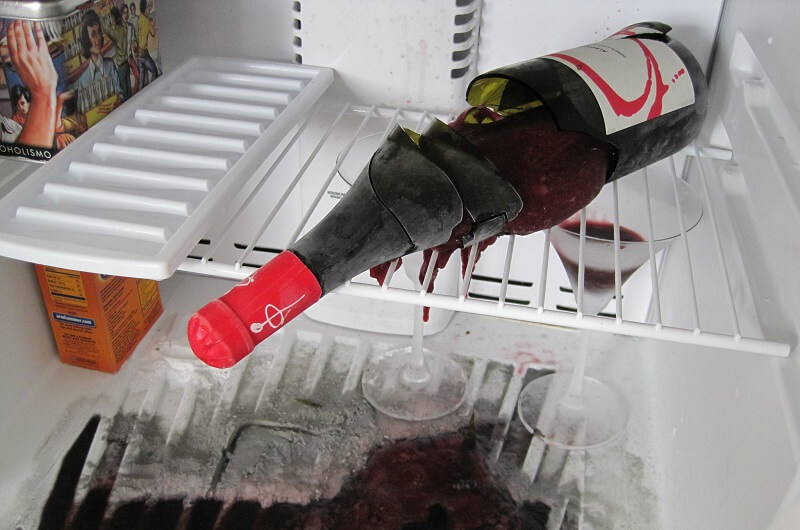Ah, wine—a nectar of the gods, enjoyed by many for its intricate flavors and ability to elevate any occasion. But what happens when you find yourself needing to chill a bottle quickly or perhaps wanting to store it long-term? You might think, “Well, the freezer seems like a good idea.” But hold on for just a moment! There are some crucial things to consider before you go ahead and shove that bottle of Pinot Noir or Chardonnay into the icy depths of your freezer. This guide will explore the question: Will wine explode in the freezer? We’ll delve into the science behind freezing wine, the risks involved, and alternative ways to chill or store your beloved bottles.
The Science of Freezing Wine
What Happens at a Molecular Level?
When wine freezes, the water content starts to crystallize into ice. This is because water has a higher freezing point compared to the alcohol and other compounds in wine. As the water turns into ice, it expands, increasing the volume within the bottle.
Pressure Build-Up
Due to this expansion, pressure inside the bottle starts to build up. Most wine bottles are made of glass, a material not designed to withstand high pressure. While some pressure can be accommodated by the bottle, there’s a limit to how much it can take.
The Role of Alcohol
Alcohol in wine serves as a sort of “anti-freeze,” lowering the overall freezing point of the liquid. Wines with higher alcohol content will thus take longer to freeze and are slightly less prone to the risks associated with freezing. However, this doesn’t eliminate the danger altogether.
The Risks of Freezing Wine
Bottle Breakage
The most immediate risk of freezing wine is the bottle breaking due to the pressure build-up. Glass is not very flexible and can shatter if the internal pressure exceeds its structural limits. If the bottle is full or nearly so, the risk is even higher.
Cork Displacement
Even if the bottle doesn’t break, the expanding ice and increasing pressure might push the cork out, causing potential leakage and certainly exposing the wine to air. This is bad news for the wine’s flavor and longevity.
Texture and Flavor Changes
Freezing can also affect the wine itself. The formation of ice crystals can disrupt the molecular structure of the wine, potentially changing its texture and taste. This is especially detrimental for wines with complex flavors and aromas, which can be muted or altered by freezing.
Sediment Formation
Some wines may also form sediment when frozen and then thawed. While sediment is generally harmless, it can be unsettling to find in your glass and can create a gritty texture.
Alternatives to Freezing Wine
If you find yourself needing to chill a bottle of wine quickly or wanting to store it for an extended period, there are safer and more effective alternatives to sticking it in the freezer.
Quick Chill Methods
- Ice Bucket with Salt: Fill an ice bucket with ice and water, and add a handful of salt. The salt lowers the freezing point of the water, allowing the wine to chill more quickly.
- Wet Towel Wrap: Wet a towel with cold water, wrap it around the bottle, and place it in the fridge. This method can chill your wine in about 15-20 minutes.
- Grapes in the Freezer: Keep a bunch of grapes in the freezer. When you need to chill wine, drop a few frozen grapes into your glass. This cools the wine without diluting it.
Long-Term Storage Options
- Wine Fridge: Investing in a dedicated wine fridge can provide optimal temperature and humidity conditions for long-term storage.
- Wine Cellar: If you’re a serious wine enthusiast, a wine cellar is the best option for storing large collections under the perfect conditions.
- Cool, Dark Place: If neither of the above options is feasible, storing your wine in a cool, dark place like a basement can also work well. Just make sure to keep it away from direct sunlight and fluctuating temperatures.
Conclusion and Final Thoughts
Storing a bottle of wine in the freezer might seem like a convenient shortcut, but it’s fraught with risks that could jeopardize both the bottle and the wine itself. From the potential for exploding bottles to compromised flavors, the drawbacks are significant. Luckily, there are plenty of alternative methods for both quick chilling and long-term storage that are not only safer but also better for preserving the quality of your wine.
So, the next time you’re tempted to throw that bottle of Merlot into the freezer, take a pause. Consider the science, the risks, and the alternatives. Your wine—and your taste buds—will thank you.
